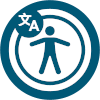Associate of Applied Science│2 Years│69 Credits│Beaver Dam Campus│Eligible for Financial Aid
WI Median Salary for Recent Graduates: $66,600
Associate of Applied Science│2 Years│69 Credits│Beaver Dam Campus│Eligible for Financial Aid
WI Median Salary for Recent Graduates: $66,600
The Diagnostic Medical Sonography program introduces students to a wide variety of specialties such as abdominal, breast, OB-GYN, vascular and musculoskeletal. Students in this program learn alongside other health science students in our state-of-the-art simulation center.
Diagnostic Medical Sonographers, more commonly referred to as ultrasound technologists, work with specialized equipment that uses soundwaves to produce internal anatomical images of the human body. Their work helps to support medical professionals in making accurate diagnoses.

A sonographer is responsible for obtaining patient history, performing the sonographic examination, maintaining patient comfort during the examination, and recording anatomy, pathology or other data for interpretation by the supervising physician.
It is the goal of the DMS program to prepare competent entry-level sonographers in the cognitive (knowledge), psychomotor (skills), and affective (behavior) learning domains for the abdomen-extended, obstetrics and gynecology, and vascular sonography concentrations.
The DMS program’s curriculum prepares students to complete the following ARDMS examinations upon graduation:
Graduates of the Diagnostic Medical Sonography program have knowledge of the normal structure and anatomy of the human body and use independent judgment in recognizing the need to perform procedures according to sonographic findings.
Career opportunities include, but aren’t limited to, the following:
Statewide Median Salary for Recent Graduates: $66,600
Moraine Park’s admissions starts with the online application. The admissions steps and financial aid process can take 4-5 weeks for some programs, so plan ahead.
View and begin standard admissions steps.
This program also requires:
Petition Process Details: Students are provisionally accepted to the Diagnostic Medical Sonography Program in “pre-core” status. When program ready, students go through the petition process.
Out of State Residents: Due to state regulations regarding program capacity limits, out-of-state residents are not eligible to apply for this program.
If you have any questions or need help with the process, please contact us at admissions@morainepark.edu OR 920-924-3200, TTY/VP:Use Relay VRS.
NOTE: This program requires minimum Accuplacer QAS or ACT Arithmetic scores to register for the algebra classes. After you have been admitted to the program, your advisor will help you understand what courses are appropriate for your next steps.
Estimated costs below are based on the 2023-2024 school year. These fees look at the cost to complete all classes. Costs, textbooks and supplies subject to change. For more details, see Cost of Attendance.
Current tuition and fees
Textbooks*
*Based on new books, rental, electronic, and used options may be available.
The cost of your degree depends on a number of factors such as total credits required, textbooks and the financial aid you receive. Some programs have additional costs such as uniforms, technology and equipment.
Please refer to the Tuition & Fee Information for enrollment fee information.
Cost of attendance (sometimes referred to as the “sticker price”) is the maximum amount of money it costs to attend college for one year and is used to determine your financial aid offering.
While attending Moraine Park during the 2024-25 school year, your estimated cost of attendance for one full year includes tuition of $4,462 (15 credits for fall and spring semester), fees of $338, food and housing of $3,008 (if living with parents, $9,147 if living on your own), books and supplies of $1,465, personal expenses of $3,608, and transportation of $4,017 for a total of $17,002. Your direct costs (those costs paid directly to the college) include tuition & fees. The indirect costs (costs not paid to the college) can vary from individual to individual and your own personal needs.
Certification Disclosure:
Coming Soon
Program Student Handbook
Diagnostic Medical Sonography Student Handbook
